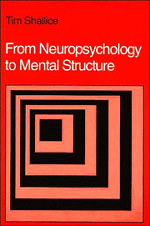Book contents
- Frontmatter
- Contents
- Preface
- I Introducing Cognitive Neuropsychology
- II Converging Operations: Specific Syndromes and Evidence from Normal Subjects
- III Inferences from Neuropsychological Findings
- IV Central Processes: Equipotentiality or Modularity?
- 12 Selective Impairments of Knowledge
- 13 The Allocation and Direction of Processing Resources: Visual Attention
- 14 The Allocation of Processing Resources: Higher-Level Control
- 15 Amnesia: What Is Memory For?
- 16 Modularity and Consciousness
- References
- Subject Index
- Author Index
- Index of Patients Cited
12 - Selective Impairments of Knowledge
from IV - Central Processes: Equipotentiality or Modularity?
Published online by Cambridge University Press: 21 October 2009
- Frontmatter
- Contents
- Preface
- I Introducing Cognitive Neuropsychology
- II Converging Operations: Specific Syndromes and Evidence from Normal Subjects
- III Inferences from Neuropsychological Findings
- IV Central Processes: Equipotentiality or Modularity?
- 12 Selective Impairments of Knowledge
- 13 The Allocation and Direction of Processing Resources: Visual Attention
- 14 The Allocation of Processing Resources: Higher-Level Control
- 15 Amnesia: What Is Memory For?
- 16 Modularity and Consciousness
- References
- Subject Index
- Author Index
- Index of Patients Cited
Summary
Introduction
One of the major causes of the sea-change in psychology that occurred in the 1960s was that the nature and organisation of knowledge, a topic that had been virtually dormant, began to become a highly active area of research. This increase of interest in the field did not, however, lead to any great degree of agreement. Views became polarised on a range of issues. Are the systems that mediate knowledge in some sense distinct from other cognitive systems, particularly those having the processes that underlie our experience of a memory? Are different types of knowledge the province of distinct semantic systems, or does all knowledge depend on a system that has a common operating principle? Is knowledge mediated by the operation of networks or schemata? Is it based on individual instances, prototypes, or what? Is there a special status for so-called basic level concepts (Rosch, Mervis, Gray, Johnson, & Boyes-Braem, 1976) – the highest level at which all members have many perceptual attributes in common – for example, dog, knife, and apple?
The wealth of experiments that have been carried out in normal subjects does not exist for neurological patients. Yet the findings that have been obtained are both surprising and highly counterintuitive. In this chapter, I will not attempt a survey.
- Type
- Chapter
- Information
- From Neuropsychology to Mental Structure , pp. 269 - 306Publisher: Cambridge University PressPrint publication year: 1988
- 3
- Cited by



